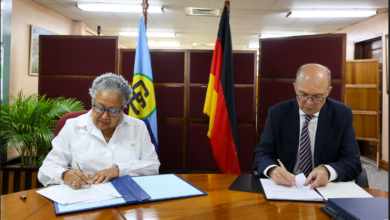|
|
|
|
(CARICOM Secretariat, Turkeyen, Greater Georgetown, Guyana) Gynaecologists and obstetricians within the Caribbean Community (CARICOM) will be better equipped to detect and treat early stages of Cervical Cancer following their participation in a series of training interventions in colposcopy and treatment of pre-invasive cervical cancer.
Colposcopy is a medical diagnostic procedure which uses a special microscope (Colposcope) to examine the cervix, and the tissues of the vagina and vulva thoroughly to be able to detect premalignant lesions and malignant lesions in these areas, which might not otherwise show up on a normal PAP smear test. The Caribbean region has the highest incidence of cervical cancer in the Americas and cancer of the uterus is among the three most common lifestyle-related diseases in the region. The remit to address this disease is outlined in the September 15 Port-of-Spain Declaration which emphasises 15 actionable points for treating with Chronic Non-Communicable Disease (NCDs). The Training of Trainers intervention forms part of a broader project funded by the government of Spain and organised by the CARICOM Secretariat to help reduce the incidence and prevalence of cervical cancer in the Caribbean by building capacity through training in the early detection and treatment of cervical cancer. The series of interventions was designed in response to the urgent need for trained health personnel to support the implementation of organized programmes for Cervical Cancer prevention and control in the Caribbean. Currently, there is little or no continuing education available to health care personnel who provide cervical cancer prevention and control services in Caribbean countries. Research done also indicates that the practice of health personnel delivering these services is sometimes “less than optimal.” The training of Trainers Workshop is therefore regarded as the most appropriate way to achieve greater results in less time. In the first phase of this project, at least 30 gynaecologists and obstetricians – the majority being females – from 15 participating States will be trained as trainers and will be expected to relay the training to their colleagues in their own country. The first intervention will be held in Jamaica on 15- 20 June and the second will follow in Trinidad on Tobago on 22-26 June. The training programme will include lectures on the Epidemiology of Cervical Cancer, Natural History of the Human papillomavirus (HPV), which causes cervical cancer and Implications for Neoplasia (abnormal cell growth) of the Lower Genital Tract; Sieving of Cervical Cancer: cytology and DNA-HPV and introduction to colposcopic tools. At the end of the training, participants will be certified as trainers in Colpocopy, and the Government of Spain has agreed to donate a colposcope to each CARICOM Member State which participates in the training. In Jamaica, participants will attend from Antigua and Barbuda, Belize, The Commonwealth of the Bahamas, Haiti, Jamaica, Montserrat and St Kitts and Nevis, while those attending the workshop in Trinidad and Tobago will come from Barbados, Grenada, Guyana, Saint Lucia, St Vincent and the Grenadines, Suriname as well as from the host country, Trinidad and Tobago. In the second phase of the project, In-country training interventions will be organised for relevant health personnel in the appropriate procedures, using personnel from the train-the-trainers workshops as facilitators. Phases three and four of the project will see the documentation and dissemination of the recommended protocols for the early detection and treatment of cervical cancer, including colposcopy as well as the sourcing and acquisition of the required equipment for designated medical institutions. Unlike most cancers, cervical cancer can be prevented, using relatively inexpensive technologies to detect and treat pre-cancerous lesions before they progress to the invasive disease. Screening is accepted as an effective tool for avoiding much of the health care costs, suffering and deaths associated with the disease. Early detection through screening and testing can prevent cervical cancer. The training is therefore expected to improve national capacity in diagnosis and to build human resources necessary to implement the programme. |
Press Releases





